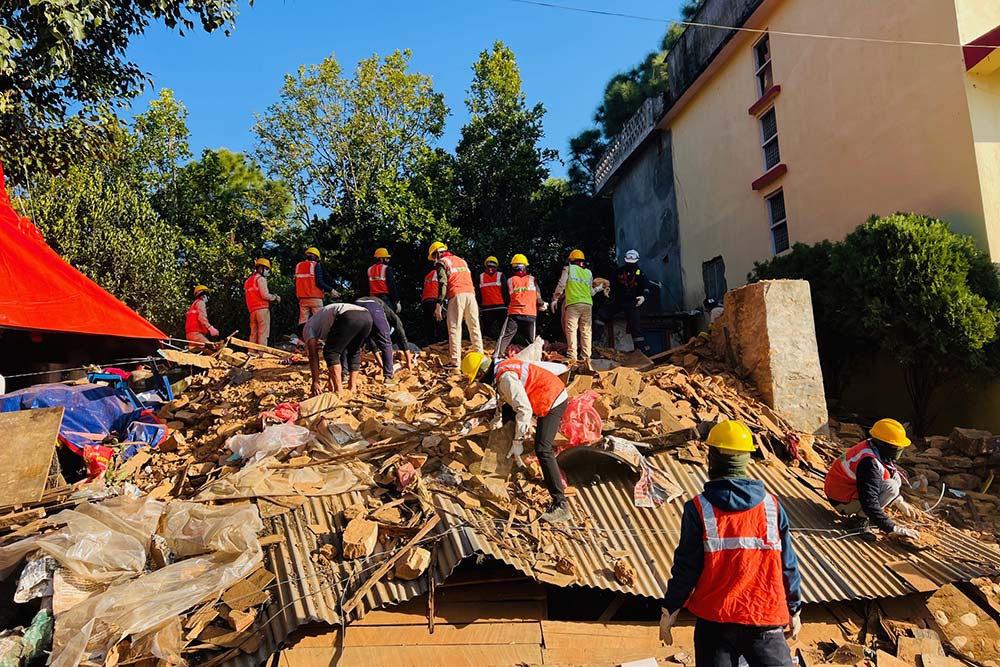
The road to economic recovery lies at fragile crossroads. Issues remain to be settled. Strong commitment needed. But is anyone listeningEven with the end of Terai strike and four-month long blockade in the first week of February, Nepal is still reeling under fuel deficiency, high inflation and depressed demands of goods and services. Though the situation has improved over the past month, it is proving hard for the Nepali economy to come out of the severe recession endured due to the last April's destructive earthquake followed by the political crisis over the promulgation of the new constitution. The crisis has taken out a large chunk of the country's economic growth. The Nepal Rastra Bank (NRB) in November had warned that the economy could slip into negative territory in the current fiscal year for the first time since FY 1982-83. The bank forecasted growth rate of two percent if the economic environment becomes normal again. Almost all sectors have been badly affected by the protracted strikes and blockade. Services sector which has enjoyed high growth rate over the past couple of years is estimated to decline in the current fiscal year. The sector which accounts for about 52 percent of GDP will face an estimated growth contraction of 2.8 percent from earlier projection of 5.3 percent, according to the macroeconomic update of the Asian Development Bank (ADB) published in December. As per the ADB, industry sector has been the hardest hit as its growth is likely to reduce by 1.3 percent which was estimated 7.3 percent earlier. Likewise, the growth of the agriculture sector is also likely to decline by 0.5 percent due to inadequate rainfall, shortage of fertilizers and the impact of fuel shortages on the harvesting of major crops such as paddy and maize. The statistics clearly point to fact that the weak Nepali economy is in dire need of a major boost to get revived. "Effective execution of plans and policies is required for economic recovery. Strong commitment and whole-hearted implementation is needed," says Deependra Bahadur Kshetry, former Governor of NRB. "The government should announce a package of stimulus." Business leaders are also urging the government to step up to re-energize economic activities. "There is an urgent need of ending energy deficiency. Ample supply of fuel is a must for industries and businesses to resume their activities," says Saurabh Jyoti, Chairman of the Tax and Revenue Committee of Federation of Nepalese Chambers of Commerce and Industry (FNCCI). Though the import of petrol, diesel and cooking gas has significantly increased after the end of the blockade, the ongoing scarcity of fuels is hampering business activities and general consumers alike. NRB former Governor Kshetry also stressed the need for government initiatives to ease fuel supply and import of goods and industrial equipments that are still stranded on Indian borders and ports. While much of the goods and equipments have made their way into Nepal after the end of the blockade, some are still left on the other side of the international border. "Normalising fuel supply and import of stranded goods is imperative to resume industrial activities. It will help increase the production as well as exports," opines Kshetry who is also the former Vice-Chairman of National Planning Commission. Abundant supply of fuel is also considered elemental in bringing down the rising inflation. Due to the supply disruptions, inflation has sky-rocketed to double-digit (12.1 percent) by the end of the first-half of the current FY. "Concerned authorities need to check the market prices through various measures," says Surendrabir Malakar, former President of Nepal Chambers of Commerce (NCC). "Lowering of customs charges is likely to help decrease the prices of essential items. Incentives to official importers would discourage black marketers." The economic sluggishness is also attributed to government's failure in spending capital budget. The government has been able to spend only over 7 percent of the capital expenditure in the first six months of the current FY. As of mid-January, the outlay has totaled Rs 15.55 billion out of Rs 208.87 billion allocated in the budget for FY 2015-16. Experts urge the government to accelerate the spending to spur the economic growth. "The government needs to ramp up capital expenditure. Slow and ineffective mobilisation of the capital budget will seriously derail development activities. Construction of important infrastructure projects will have to face uncertainty, thus slowing the already depressed economy," warns Kshetry. The political wrangle has also largely hampered reconstruction and rehabilitation process in the areas affected by the earthquake. The recovery program which is aimed to revitalise economic activities has not gained traction due to the dispute over the appointment of the CEO leading the National Reconstruction Authority (NRA). The apex-body to oversee the reconstruction got a CEO in December, eight months after the disaster hit the country. "The torpid response to the post-quake recovery is sending negative messages," says NCC former President Malakar. “Reconstruction is important for the private sector too. It will accelerate industrial and business activities.” He stresses a need for change or amendment in the Public Procurement Act to remove various hassles regarding the purchase of products and technology by the government. "This will ensure smooth operations in reconstruction and rehabilitation." NRB former Governor Kshetry suggests the government to focus on encouraging businesses and employment generation while engaging on the process. "The post-quake reconstruction is pivotal for economic recovery. Proper plans should be formulated and implemented so that rural area-centered industries and businesses can be motivated." FNCCI's Tax and Revenue Committee Chairman Saurabh Jyoti emphasised on livelihood-focused reconstruction and rehabilitation. "We need to promote micro ventures and cooperatives to raise the livelihood of the quake affected population. Cottage industries, for instance, can effectively help the rural populace to generate income." The country's private sector is looking for government's support to overcome last year's enormous losses. The loss to the private sector has amounted over Rs 304 billion during the five months of turmoil. The halt in import left the sector with over Rs 7.5 billion in demurrage charges. "The loss can be compensated through the deduction of various taxes," suggests Jyoti. Surendrabir Malakar, meanwhile, asks the government to engage in talks with the southern neighbour to waiver the demurrage and detention charges imposed on Nepal-bound cargoes by Indian shipping companies and container freight stations during the blockade. While the private sector has befallen victim to the political turbulence, the government has done little to address the grievances of the economic growth engine of the country. Analysts propose forming a taskforce to help the private sector overcome the effects of the recent unfortunate events. "A taskforce of concerned government officials, business representatives and economists/experts can be formed. It will analyse the difficulties of private sector and make proper recommendations to the government to get the problems addressed on the policy level," mentions Kshetry. Nevertheless, the root cause of the economic damage lies in the political dispute which needs to be resolved first, analysts and private sector leaders say. Though the agitating Madhesi Morcha has called off the strike and other disturbances, the core issue of federal demarcation is yet to be settled. In the recent days, the Morcha is threatening another phase of strikes if issues go unresolved. "Political stability is the most important factor for economic revival. This period of relative calm must be utilised to quell the disputes through negotiations," says Kshetry.
Published Date: March 25, 2016, 12:00 am
Post Comment
E-Magazine

Click Here To Read Full Issue
RELATED Feature




